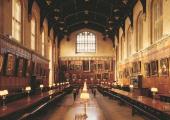Art Gallery: Howard Hodgkin - Time and Place



The central character in Shakespeare's final play, The Tempest, is a betrayed Duke called Prospero. Prospero means omniscient panic: an apt name for an all-powerful creator of tempests and general wreaker of revenge. However, the profound appeal of this 400-year-old play, which I am directing in the Oxford Shakespeare Company's site-specific open-air touring production this summer, lies not in the narratives of malignant magi and lustful monsters, power-craving lords and their wine-craving servants.



When artistic director Dominic Cooke took up his new post at this venue in 2007, he said that he wanted “to look at what it means to be middle class, what it means to have power, what it means to have wealth”. Although this comment caused a lot of fuss, with die-hard Royal Court fans imagining that he was about to betray the theatre’s tradition of staging plays about low-lifes, Cooke’s programming has managed to balance gritty underclass dramas with plays about the rich and privileged.

“If I were a woman I would shag as many of you as had pubes and pricks that gave me sexual pleasure…” No less elderly than he is eminent, Professor Stanley Wells – editor of the Oxford Shakespeare and international authority on the Bard – smiles placidly around the room at his blue-rinsed audience. It’s less than 10 minutes into my first event at Oxford’s prestigious literary festival, and decidedly not what I had anticipated.

Walk into the gaping mouth of the metal container featured in Miroslaw Balka’s installation at Tate Modern’s Turbine Hall and you are plunged into a disorientating darkness. Unnerved, you shuffle forward, passing and perhaps finding comfort in the ghostly presence of other limbs, other bodies which are also shuffling uncertainly, all awareness of spatial relationships denied in the enveloping blackness.